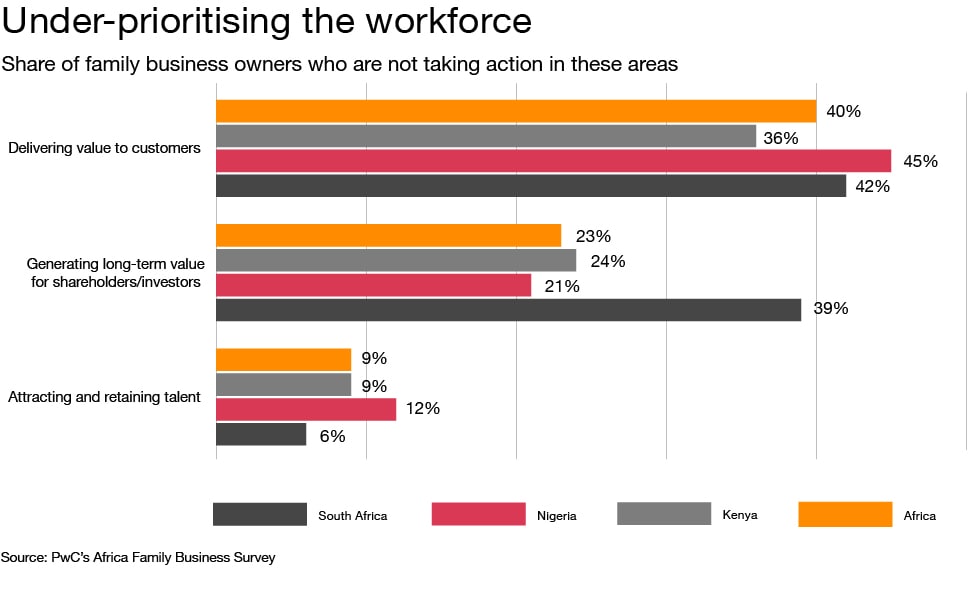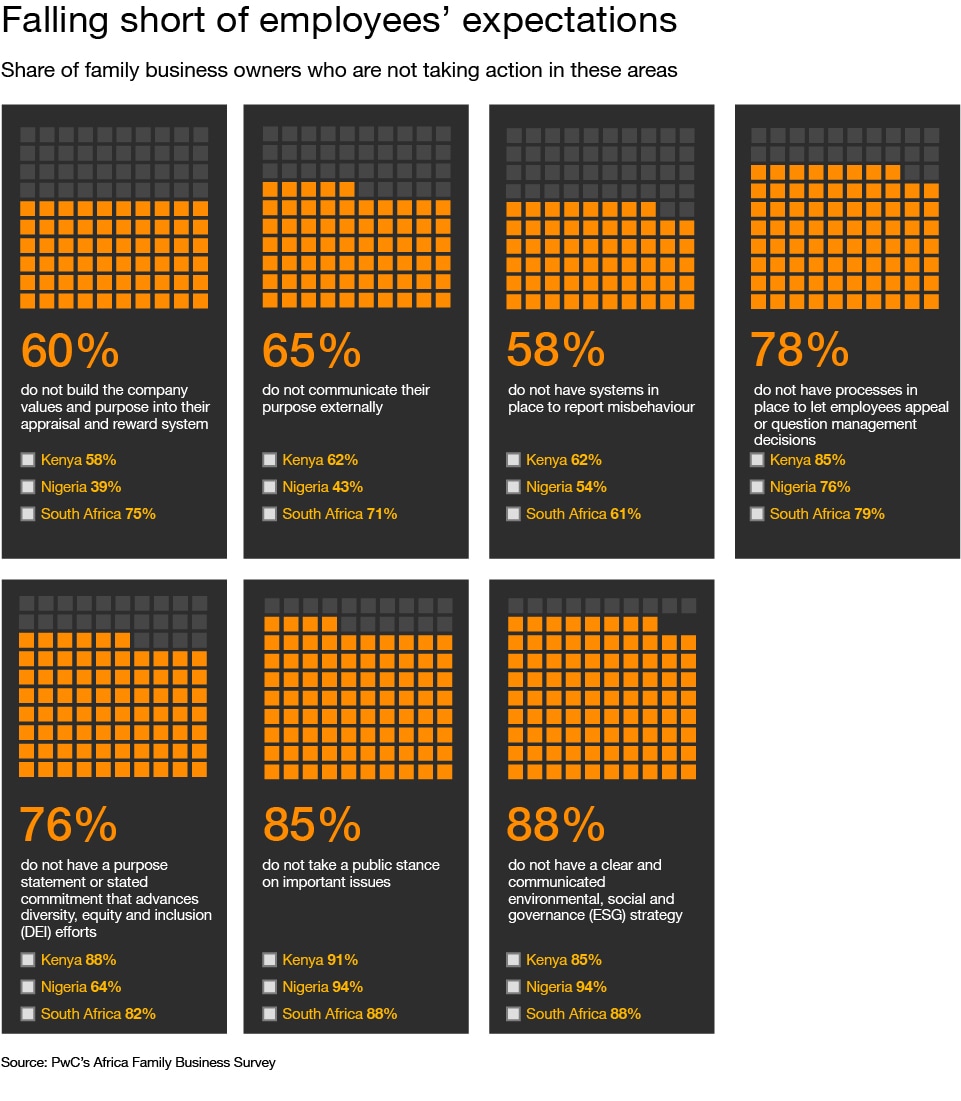Insights from PwC’s Africa Family Business Survey reveal new ways to meet the changing expectations of this crucial stakeholder group.

This article is the second in a series of deep dives into the findings from PwC’s Africa Family Business Survey, each focusing on one of three key stakeholder groups: customers, employees and family members.
One of the most striking findings to come out of PwC’s Africa Family Business Survey is the fact that only 47% of the 172 family business leaders who responded believe they are fully trusted by their employees, though 94% say that the trust of their workers is essential or very important [Kenya 97%; Nigeria 82%; South Africa 91%]. Given that discrepancy, it is perhaps even more surprising that a quarter [Kenya 24%; Nigeria 36%; South Africa 18%] of respondents said they will prioritise building trust with their employees in the next two years, and only 9% [Kenya 9%; Nigeria 12%; South Africa 6%] say a top priority is attracting and retaining talent.

This disconnect could have significant consequences for businesses’ future. There is a strong correlation between trust and profitability, and the survey findings suggest that the correlation extends to employee trust: companies that prioritised their employees, gave them incentives, and invested in attracting and retaining talent reported higher levels of growth in the prior 12 months than companies that didn’t take those measures. As Hasit Patel, COO of the Ramco Group, a Kenyan diversified family business, put it: “We believe that we should maximise the potential of our people. We believe in giving our employees opportunities where possible and that there is strength in diversity. These are the things that inspire me. Creating a culture of safety enables people to admit their mistakes. You are never going to get everything right. What matters is how you correct your mistakes.”
In this article, we’ll take a deep dive into the relationship between employers and employees, highlighting where family businesses are falling short in their efforts to build trust, and we will also be proposing ways to strengthen that relationship. Powerful demographic shifts mean that most employees are now from generations—millennial and gen Z—whose values differ from those of baby boomers and gen X, the cohorts who now lead most businesses. What employees are looking for today in their working lives is at odds with what family businesses are providing, according to our survey.
What employees expect from their employers has changed over time, in terms of both employment packages and perceptions of the company they work for. Increasingly, people are prioritising skills development, work–life balance and wellness. Indeed, the relative importance of financial compensation has declined by 24% over the past decade (though the data was collected before the current cost of living crisis). And importantly, employees today want the companies they work for to reflect their own values and concerns.
In a recent PwC study, Beyond compliance: Consumers and employees want business to do more on ESG, 86% of employees said they wanted to work for a company that shared their values, and in PwC’s 2023 Trust Survey of more than 2,000 employees, 53% said it is very important that their purpose and values be aligned with their employers’. The data from the Africa Family Business Survey shows that family businesses are not in tune with those expectations.

The new paradigm for building trust with employees
In our overview of the Africa Family Business Survey findings, we identified a new formula for building trust to improve business outcomes—one that goes beyond simply providing good products and services to customers. This formula includes being vocal about values, walking the talk on environmental, social and governance (ESG) and diversity, equity and inclusion (DEI) issues, and speaking out on social issues. The formula also calls for strong communications about what actions business leaders need to take to keep employees on their side.
Trust is built from the inside out, and a company won’t be trusted by its customers if it’s not trusted by its employees. ‘The opposite of trust is control—you can’t control people who have your trust: they have to find ways of doing things [for themselves] and be allowed to do it,’ says Hans-Jacob Bonnier, executive vice president of his family’s publishing company, Bonnier News Business.
Four actions you can take today
Four key moves can help companies create an environment that will close the trust gap with their employees.
1. Communicate the company’s purpose and values. Family businesses believe they know what they stand for — 84% say they have a clear purpose [Kenya 73%, Nigeria 85%, South Africa 85%] — but they do not make this the focus of their communications. Though 61% say their company purpose is communicated internally [Kenya 63%; Nigeria 75%; South Africa 61%], only 44% write it down or publish it on their website [Kenya 46%; Nigeria 54%; South Africa 32%]. The business’ values should be front and centre, set out clearly on the website and on all external and internal communications. Regular reporting should reinforce what the company is doing to demonstrate those values. An even more important priority is aligning the company’s appraisal and reward system with its values and purpose. More than half of the survey’s respondents do not do this.
Family businesses have traditionally shunned the limelight, but more are beginning to open up about how they operate and what they stand for.
"Your company's culture starts with you and sets the tone of the business. You must talk and live your culture daily, even when it is difficult. In this way, your staff will remain true to your vision, allowing them to contribute effectively towards the company's mission."
Neil Andrews, The Baby Food Company, South Africa“We would rather lose half of our clients than half of our client’s money."
Jack Mitchell, Former director and portfolio manager at Allan Gray, South Africa“After 53 years of operations, our values have really acted as a guide for our decision making, from recruitment, performance appraisals and ethical decisions as we work in the healthcare sector. We have identified a culture of trust as foundational and as such have strived to design routines, processes, rewards and recognition, and development programmes that support establishing this culture. We also changed our vision ‘to be Africa’s most trusted name in healthcare’ to reflect how important this is to us.”
Dr. Elikem C. Tamaklo, Managing Director, Nyaho Medical Centre.2. Deliver on non-financial goals and values. Family businesses should be transparent about the progress they’re making on non-financial goals. There is strong evidence that employees want their employers to show commitment to ESG issues, and to be more transparent about their ESG activities. In PwC’s 2022 Global Workforce Hopes and Fear Survey, 53% of the 52,000 workers who responded said it’s important that their employer be transparent about the company’s impact on the environment, and 54% said it’s very important that their employer be transparent about its record on DEI. Yet only 41% of family businesses regularly communicate how they are performing against these types of non-financial commitments [Kenya 38%; Nigeria 46%; South Africa 46%].
In our survey, only 38% of respondents said there was a person responsible for DEI [Kenya 39%; Nigeria 27%; South Africa 55%], and only 44% had an ESG leader [Kenya 45%; Nigeria 30%; South Africa 55%]. If companies are serious about these issues, they need to appoint senior leaders who are responsible for making progress in these areas and reporting on that progress.
Nestlé was acknowledged by the Bloomberg Gender Equality Index (GEI) for its transparency in gender reporting and enhancing women’s equality. This highlights Nestlé’s efforts in empowering women across its value chain and continuously creating equal opportunities for all its employees. According to the 2021 Global Gender Gap Index, Rwanda and Namibia were in the top ten countries with the highest gender equality in the world. Within Africa, women play a huge role in small-sized/micro family businesses but are invariably excluded from leadership positions in large, internationally active family firms, according to the Women in African family businesses publication.
3. Create opportunities for development and upskilling. Findings from PwC’s Future of Work and Skills Survey show that companies that actively create opportunities for their employees to build skills achieve more consistent results, have greater earnings resilience, and demonstrate a superior ability to attract and retain talent. Yet, less than half of the 54,000 workers surveyed in PwC’s 2023 Global Workforce Hopes and Fears Survey said their employers provide them with the opportunities to apply the skills that they think will be most important to their careers in the next five years. And although two-thirds of employees in that survey said they are confident their company would support upskilling, that still leaves one in three who are not.
The message: be clear about upskilling opportunities, and create clear pathways for advancement within the organisation. These formal mechanisms will deepen employee trust.
"In keeping with our culture, we always try to promote from within the company as we believe growing our teams is imperative. In this way, evolving and changing the job scope provides for personal growth and leads to operational improvement within the business."
Rozi Andrews, The Baby Food Company, South Africa.4. Listen to your people. Creating a culture in which employees can voice their opinions and concerns, knowing they will be taken seriously, builds trust. For the companies employing the 58% of respondents in the Africa Family Business Survey who said their workplace lacks a system for reporting misbehaviour, the remedy is relatively simple: introduce a formal, secure mechanism to report incidents, making sure that credible reported incidents are acted on. Many companies, for example, have a dedicated whistle-blower hotline. Companies should also have a process in place for employees to appeal management decisions.
One stumbling block is a perception gap between employers and employees when it comes to speaking up. PwC’s 2023 Global CEO Survey of more than 4,400 leaders worldwide found that 56% of CEOs believe their managers encourage dissent and debate. And yet, 63% of employees polled in PwC’s 2023 Global Workforce Hopes and Fears Survey said their bosses rarely encourage them to speak their mind.
To their credit, the leaders participating in the Africa Family Business Survey seem to be aware of their own shortcomings in this regard: 78% of them admitted that they aren’t very advanced in the area of enabling employees to appeal management decisions. The solution, however, may be more complicated than simply introducing a hotline; it will require creating a stronger culture of empowerment among rank-and-file workers. Empowering employees by giving them autonomy to make decisions will help bridge the trust gap. Culture should never be an afterthought in workforce strategy.
As noted in our overview of the survey findings, the trust advantage for family businesses is narrowing. The 2023 Edelman Trust Barometer notes that a decade ago, family businesses’ trust score was 20 percentage points higher than that of non–family businesses’; today, the margin is just six points. Winning the trust of employees—by improving communications, delivering on ESG and DEI, creating development and upskilling opportunities, and empowering workers to speak up—will go a long way to regaining that trust premium.
Contact us

Andrea Benkenstein
Director | South Market Family Business Leader, PwC South Africa
Tel: +27 (0) 21 529 2754















